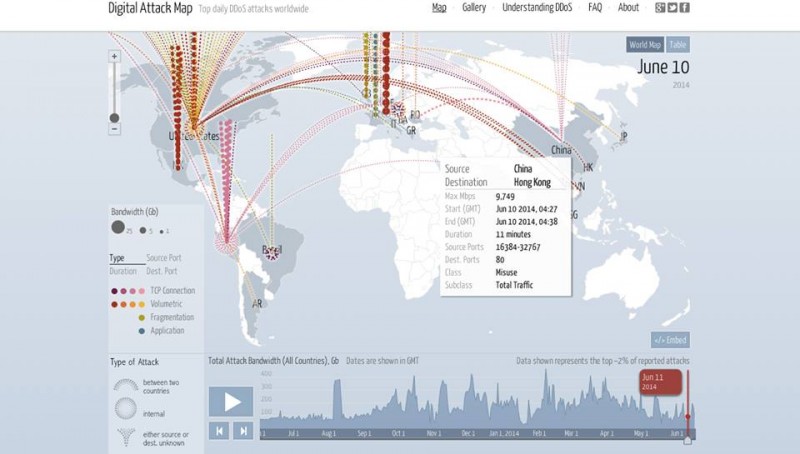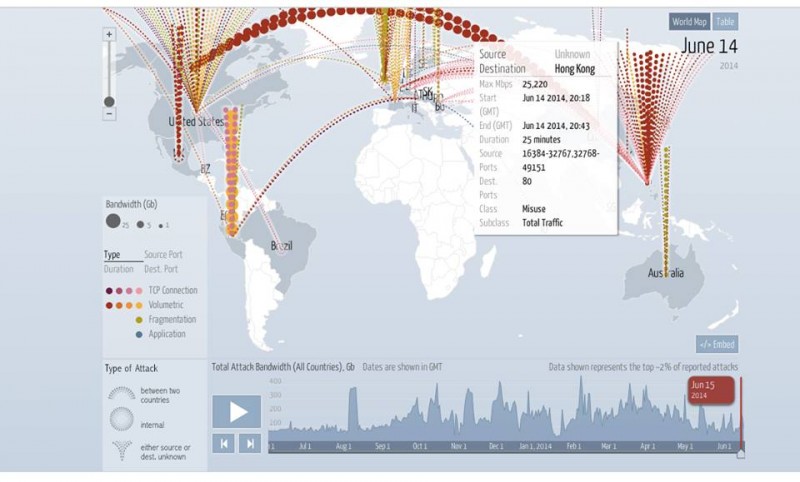Between Friday, June 13, and Wednesday, June 18, Hong Kong suffered two DDoS attacks aimed at pro-democracy sites.
The targets—one, the site of civil society group “Occupy Central with Love and Peace”, the other newspaper Apple Daily—both seek to advocate for universal suffrage in Hong Kong.
Since 1997, when Hong Kong’s period under British control ended and the city-state came under Chinese rule, many of its top officials have been elected by a small group of Beijing loyalists. Occupy Central advocates for a civil referendum that would shift voting power away from these Beijing loyalists and to Hong Kong’s citizenry, allowing them the right to vote in elections that determine who will be Hong Kong’s Chief Executive. Recently, Occupy Central, with the help of Hong Kong University’s Public Opinion Programme (HKUPOP), planned to run an online public opinion poll between June 20 and 22 to vote on a referendum on constitutional reforms.

Google’s Digital Attack Map, June 10, via Global Voices Advocacy.
Occupy Central’s three web hosting services suffered violent DDoS attacks; due to the fallout of the incident, only one of these services, Cloudflare, still supports the voting system. As a proposed workaround to the voting system’s susceptibility to attacks, Hong Kong University’s Public Opinion Program is now considering using telephone lines instead, a weak alternative to the online platform.

Google’s Digital Attack Map, June 14, via Global Voices Advocacy.
The second target of the attacks, Next Media’s Apple Daily, is an independent Hong Kong newspaper often critical of Beijing. Its founder, Jimmy Lai, is a vocal supporter of Occupy Central. Apple Daily has encouraged its readers to vote on Occupy Central’s referendum.
The attacks were separately orchestrated. That said, Next Media chairman Jimmy Lai suspects that mainland Chinese hackers, eager to suppress Hong Kong’s emerging democratic impulses, wanted to silence two of the city’s most audibly pro-democracy voices through these attacks.
The attacks aren’t limited to Apple Daily and Occupy; they come in a long line of incidents in which pro-Beijing forces, working online, have tried to suppress groups within Hong Kong that are working toward greater democracy. In anticipation of the June 4 anniversary of the Tiananmen Square protest in 1989—an anniversary that sparked wide censorship across mainland China—the website of the Hong Kong Alliance in Support of Patriotic Democratic movements was also taken offline by sustained DDoS attacks. In October 2013, Global Voices Advocacy anticipated that malicious hacking of civic groups and activist communications like those of Occupy Central would surge approaching July. A similar DDoS attack occurred on HKUPOP’s servers in March 2012, shortly after HKUPOP held mock elections for the city’s Chief Executive.
Occupy Central and Apple Daily’s founders both feel that Beijing loyalists are undoubtedly behind the attacks, given the subversive, pro-democratic nature of both sites in the wake of increasing tensions between Hong Kong’s pro-democracy supporters and the mainland Chinese government. That said, no particular hacking forces have come forward and taken responsibility for the attacks.
